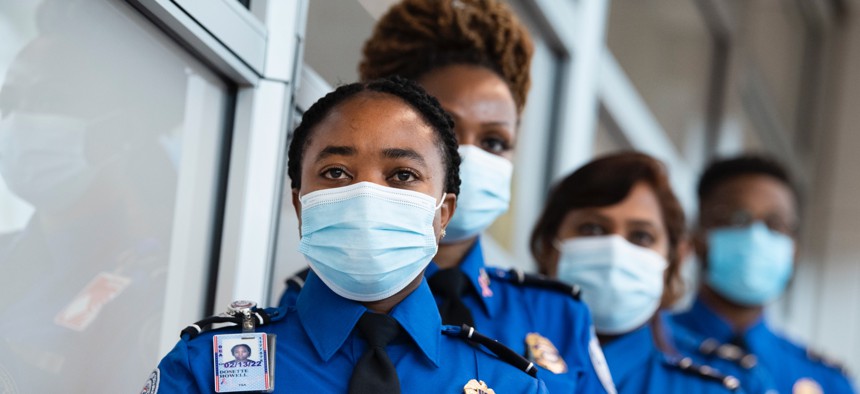
A new union contract between TSA and the American Federation of Government Employees is awaiting agency head review within the next 30 days. Tom Williams / Getty Images
Employees ratify TSA’s first union contract since rights expansion
The American Federation of Government Employees’ new collective bargaining agreement streamlines grievance and arbitration rules and greatly expands work-life balance policies like shift trading.
Employees at the Transportation Security Administration on Monday voted to ratify a new union contract with agency leadership that streamlines dispute resolution processes and expands policies promoting work-life balance like shift-trading.
When the TSA was founded following the Sept. 11, 2001, terrorist attacks, Congress gave the agency leeway to create its own personnel system. As a result, employees lacked collective bargaining and other workplace rights until then-President Obama authorized abridged unionization rights for the TSA workforce in 2011. The Biden administration in 2021 expanded employees’ rights to match those enjoyed by most other federal workers and mapped the agency’s pay system to the General Schedule, though Congress has yet to codify those changes in law.
The contract between TSA and the American Federation of Government Employees, which is currently subject to agency head review for the next 30 days before it will be implemented, simplifies the arbitration and grievance policies from 74 pages down to two and greatly expands union officials’ access to official time. It also increases cash allowances for the purchase of uniforms and gives transportation security officers greater flexibility in how they spend it.
“The new agreement puts us on the road to full Title 5 rights, better retention at TSA and will greatly increase the quality of life for the TSOs that we represent,” said AFGE Council 100 President Hydrick Thomas in a statement. “It’s been a long journey since the beginning of our union, when we barely had any say in what happened in our workplace. This agreement is a testament to the power of union membership.”
In an interview with Government Executive, AFGE Council 100 Secretary-Treasurer Johnny Jones said some of the biggest gains in the contract come in the form of policies aimed at improving employees' work-life balance. One provision expands the practice of shift-trading from 20% of an employee’s work hours to 40%, while another allows TSOs to work double shifts. Another will allow for bargaining to take place on the local level, an important tool with a workforce spread out across more than 400 airports across the country.
Two issues remain unresolved, however. Negotiations over overtime work and child care subsidies are both going to arbitration, though Jones said management has agreed to establish a working group on child care that could spur agreement down the road.
“We weren’t able to get the language we would like, but to have a working group that will start negotiations [is important], as it’s very expensive to find daycare for our employees,” Jones said. “Until we find a real, workable solution, it’s going to impact the workforce and the ability to maintain employment at TSA. It’s such an expensive burden on the employee.”
Jones said a major priority in contract talks was spelling out employees’ workforce protections and collective bargaining rights, given that those rights have been installed administratively and not as the result of legislation.
“We’ve laid out everything we can think of, just to make sure it’s there in case something comes about [that could jeopardize those rights],” he said. “[One] of our concerns are with [our rights] not being in law. [Administrator David] Pekoske is fully committed to making sure this works, so it’s not him we’re worried about. But if there’s a future administration who comes along or a change in the Homeland Security secretary, they could start peeling those rights back, if not terminate them altogether . . . That’s a very grave concern, given the political makeup today.”
Despite worries about future administrations taking rights away, Jones said he is optimistic both about TSA’s efforts to improve employee engagement and morale, as well as the agency’s commitment to collaborative labor-management relations.
“Pekoske’s been very forthcoming, and he put the right people in place to do the job, so full kudos to him for who he put in charge of handling labor-management relations for TSA,” he said. “Our relationship [with management] is as good as it’s ever been in my career, and I joined the agency in 2002.”







